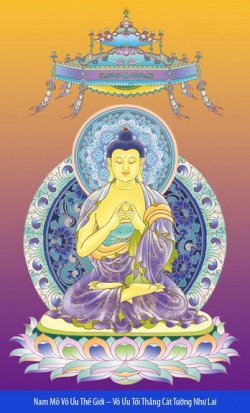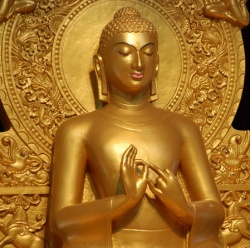Hitchens gets it wrong about Buddhism By George Dvorsky
I’ve never really paid much attention to Christopher Hitchens, renowned and reviled critic of all things religious. But when my brother recently brought his anti-Buddhist sentiments to my attention I had to take a closer look.
- “Don’t believe me, don’t believe anybody, don’t accept anything based on tradition. Don’t believe anything based on the fact that your community believes this or your country believes this or the people that you are around believe this.” - Buddha
As it turns out, he does indeed have some very uncomplimentary things to say about Buddhism.
Hitchens essentially believes that the West has been duped by what he regards as just another religion filled with all the usual trappings. He regards Buddhism as a “faith” that “despises the mind and the free individual.” He says it preaches submission and resignation, and that practitioners come to regard life as a “poor and transient thing.”
In his book, God is not Great, Hitchens writes,
- “Those who become bored by conventional “Bible” religions, and seek “enlightenment” by way of the dissolution of their own critical faculties into nirvana in any form, had better take a warning. They may think they are leaving the realm of despised materialism, but they are still being asked to put their reason to sleep, and to discard their minds along with their sandals.”
Wow. Pretty harsh stuff. Hitchens doesn’t mince words and slams into Buddhism like he would any other religion.
That’s all fine and well, except that Buddhism isn’t just any other religion.
What Buddhism is
Yes, Buddhism has the characteristics of religion, but it offers much more than that.
It’s an epistemological philosophy and an intrapersonal approach to perception, self-awareness and self-regulation. It’s an aesthetic. It’s a non-anthropocentric ethical viewpoint that places an emphasis on meaningful, compassionate and genuine relationships. It’s a type of Humanism. It encourages meditation and a mindful approach to living. It’s a worldview and methodology that promotes skepticism, rationality, empiricism and even non-conformity. It is the practical acknowledgment of the unavoidable perceptual subjectivity that is part of the human condition. It is the recognition that the mind matters and that conscious awareness can and should be optimized.
Buddhists believe that by paying close attention to moment-to-moment conscious experience it is possible to move beyond the sense of “self” in favour of a new state of personal well-being. And if this can be incorporated within the framework of formal scientific investigation, then all the better.
And all this without the usual baggage and expectations of most religions, namely belief in God, the soul, judgment and the afterlife. It does not promote any fixed dogma, nor does the practice result in feelings of guilt or shame. There are no ‘sins’ to be committed in Buddhism, nor are there highly polarized notions of right and wrong; practitioners simply do the best they can to mete out as little suffering to the world as possible.
But like all Big Ideas, Buddhism can be prone to abuse and misunderstanding—and as Hitchens has correctly noted, even tribalistic tendencies.
Institutionalized Buddhism
Indeed, a big part of Hitchens’s grief with Buddhism is its questionable history and how it has become highly ritualized and filled with other-worldly beliefs. As he has said, “Buddhism can be as hysterical and sanguinary as any other system that relies on faith and tribe.” Hitchens has railed against the Dalai Lama and the Tibetan Buddhists. He condemns the Burmese dictatorship as a Buddhist one (which seems a suspicious claim to make these days seeing as thousands of monks have recently stood up against this regime). Hitchens dips deep into history and blames Buddhism for a number of misguided practices and atrocities.
While I agree that Buddhism has been used in this way and that blood has been shed in its name, I can’t agree that Buddhism is the cause of these things. What Hitchens is describing is the failure of human nature, the perils of insular groupthink, and politics itself. It is the same phenomenon that has led to the bastardization of the teachings of Jesus and the rise of such monolithic institutions as the Catholic Church (along with its sordid history of conquest and persecution). Consequently, Hitchens’s ire should be directed at the phenomenon of tribalism and not religion itself.
Buddhist faith?
Hitchens also makes the claim that Buddhists rely on faith. Undoubtedly, beliefs in reincarnation, karma and transcendence run deep within various Buddhist strains. This is currently a point of great contention among Buddhist scholars, some of whom, like the secular Buddhist Stephen Batchelor, contend that these precepts are unnecessary and that when it comes to metaphysics Buddhists should actually be agnostic. More traditional Buddhists, on the other hand, argue that belief in rebirth is absolutely necessary to the practice.
Interestingly, the Dalai Lama himself – a believer in reincarnation – maintains that science should take precedence over these sorts of notions. He once said, “My confidence in venturing into science lies in my basic belief that as in science so in Buddhism, understanding the nature of reality is pursued by means of critical investigation: if scientific analysis were conclusively to demonstrate certain claims in Buddhism to be false, then we must accept the findings of science and abandon those claims.”
Easier said than done, of course. Deeply embedded and ritualized religions have an incredibly hard time adapting to change—including Buddhism.
As for the accusation that all Buddhists rely on faith, that’s clearly a generalization. Most Buddhists, I would say, likely take nothing on mere faith alone.
Alternative perception
Hitchens also critiques the aims of Buddhist practice itself. He makes a number of suspicious claims—that Buddhists despise the mind and the free individual, that Buddhism teaches submission and resignation, and that practitioners regard life as a fleeting thing full of suffering. He contends that Buddhists require a surrendering of the mind.
This is mostly nonsense. These claims have been countered elsewhere, so I won’t replicate them here, but there are a pair of issues I wish to address.
First, Hitchens appears to be confused. He seems to be conflating transcendental meditation (or something like it) with the more traditional practice of Vipasanna meditation and its focus on mindful awareness. There is nothing escapist or transcendent about this practice; rather, it’s very much about focusing on the here-and-now and correcting the processes of a conditioned mind.
Second, Hitchens complains that Buddhists favour subjectivity over objectivity. “[Y]ou’re supposed to be the subjective judge of what you’re experiencing, are you not?,” he asks. Hitchens, being the uber-materialist that he is, is concerned that Buddhists don’t believe that anything can be accepted at objective face-value, that Buddhists merely see existence as some sort of grandiose illusion.
Hitchens’s special claim into the true nature of reality aside, he is a bit off course here and his concern is exaggerated. Buddhists do not deny the presence of the material world or the value of objectivity – far from. What they assert is that the Universe will always be perceived through the lens of an observer and that our comprehension of reality must always take this into account. The only way the world can be observed is subjectively; there can be no such thing as a truly objective observer. We can and should strive towards an objective frame, but the world will always be perceived by an observer, which is by definition a subject.
It’s okay to be spiritual, really it is
What irks me most about Hitchens’s critique of Buddhism is the sense I get that what he is really complaining about are personal quests for spirituality. In fact, some of his arguments are so pithy (like making fun of Buddhist koans and Steven Seagal) that I’m inclined to think he is slamming into Buddhism just for the sake of it—because it’s just another “religion” on his hate list.
But Hitchens hasn’t done his homework and it shows. Moreover, his limited acceptance as to what kind of worldview and perceptual lens is acceptable is extremely limited and narrow-minded.
Ultimately, there’s nothing wrong with spirituality. Or, if you hate that word, a sense of existential awareness. In fact, I wish more people would consider the philosophic implications of existence and look deeper within themselves. There is far too much daydreaming going on today with people living way outside their heads.
On the issue of spirituality I’ll give Sam Harris the last word:
- “There is clearly a sacred dimension to our existence, and coming to terms with it could well be the highest purpose of human life…t must be possible to bring reason, spirituality, and ethics together in our thinking about the world. This would be the beginning of a rational approach to our deepest personal concerns. It would also be the end of faith.”
Sources
- “An Interview with Christopher Hitchens,” C. P. Farley.
- “Christopher Hitchens reduces Buddhism to a phrase,” True Ancestor.
- “His material highness,” Christopher Hitchens.
- “Christopher Hitchens: Religion Poisons Everything,” Jon Wiener
- “Hitchens - Zen is not Great?,” Flapping Mouths.
- http://en.wikipedia.org/wiki/Sam_Harris_%28author%29 Wikipedia] and Wikiquote
About Author
George P. Dvorsky serves as Chair of the IEET Board of Directors and also heads our Rights of Non-Human Persons program. He is a Canadian futurist, science writer, and bioethicist. He is a contributing editor at io9 — where he writes about science, culture, and futurism — and producer of the Sentient Developments blog and podcast. He served for two terms at Humanity+ (formerly the World Transhumanist Association). George produces Sentient Developments blog and podcast.







